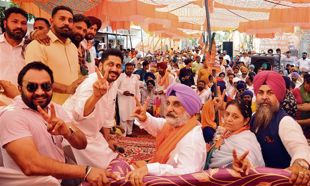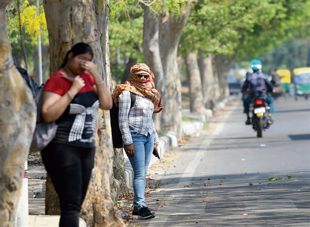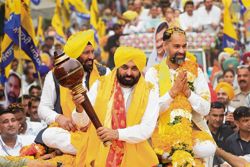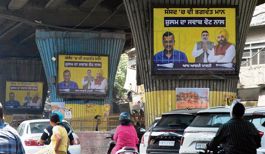
Illustration: Sandeep Joshi
Harish Khare
A year ends today. These were difficult 12 months for India. The country finds itself in a kind of morass: there is neither much to celebrate nor much to complain about.
Nothing symbolised better the sense of drift than the sad tragedy in Mumbai. We have managed to cauterise ourselves against the loss of human lives in avoidable tragedies; instead, we are becoming good at doing nothing except bemoan the total collapse of civic authority in all our metros as well as in small towns. An insatiable greed is rampant in society; and, we can neither enforce nor respect laws and regulations, meant for our own safety.
The economy is not robust, but neither has it gone bust. It will be up to the Finance Minister, Arun Jaitley, to use his Budget to reassure the vast majority of the Indians masses that ‘vikas’does not necessarily mean an unfair deal for them. Economic discontent among the poor and financial stress among the middle classes got markedly aggravated in 2017.
The polity finds itself, at the end of the year, in a kind of equilibrium after the Gujarat elections, making political rivalry between the BJP and the Congress a less one-sided affair. Prime Minister Narendra Modi remains a powerful and effective demagogue, with Rahul Gandhi just beginning to find his feet.
The politicians’squalid quarrels have made life complicated for independent journalists, editors and newspapers.
The news channels, especially the English ones, have given up any pretence at fairness or balance.
The social media instigates outrage, aids and abets a culture of denunciation and demonising. Civilised conversations are no longer possible. We have managed to poison the wells of reasonableness in our political society.
It took a magistrate — CBI Special Judge OP Saini — to slap us all across our institutional faces. All those whom we castigated and calumniated in the “2G scam” were acquitted. That verdict left all considerably chastened and reminded us of the dangers of the mob defining us — our politics and our morals. As a nation, we are at a loss as to how to compensate those whom we first put in jail and then exonerated them. Nor do we know what to do with someone like Vinod Rai who so wantonly hurt the national economy and our global image.
Those who resist the consuming demands of the politicians are denounced as lacking in deshbhakti, or are dubbed as anti-national, and simply pronounced as biased. The rabble is incited and instigated to invoke Bharat Mata and assault anyone who dares to dissent from the officially prescribed orthodoxy.
In this somewhat depressing scenario we at The Tribune feel that both our dharma and karma demand that we remain resolutely committed to the norms and practices of firm and fair journalism.
And so shall be our endeavour.
********************
I am always partial to bureaucrats who take time off to undertake an academic project, like writing a book. The other day, I was pleased to welcome Raja Sekhar Vundru, an IAS officer of the Haryana cadre, over a cup of coffee. He presented me with his book, Ambedkar, Gandhi and Patel — The Making of India’s Electoral System.
Both Gandhi and Ambedkar have been written about a million times and one more book would not have added to our understanding; but Vundru has added Sardar Patel to the equation and further narrowed his inquiry down the tortuous negotiations among the three over what kind of place the ‘untouchables’/Harijans/Dalits would have in the new Independent India. He has trawled the published documents and works to put together a coherent and interesting snapshot of the Gandhi-Ambedkar relationship, irritatingly fluctuating since the days of the Poona Pact.
Perhaps, the most salacious part of the story Vundru has to tell deals with how Patel was dead set against Ambedkar. This argument becomes even more spicy in the context of the current political posturing: the BJP wants to appropriate both, Patel and Ambedkar and has tried to put them in juxtaposition against Jawaharlal Nehru and the Indian National Congress.
After the Partition, there was a dramatic shift in attitudes and thought processes; suddenly, the imperative need was for consolidation and stability. Patel became implacable. He was unsentimentally against conceding anything that would remotely resemble “separate electorates”, proposed by Ambedkar. Vundru informs how it was the Sardar who “took control of the proceedings and decisions on Scheduled Castes and other minorities” at a very critical time during the framing of the Constitution.
Ambedkar had reconciled to reservations in legislatures but wanted it “continue till untouchability is completely abolished.” That, too, was not acceptable to the Sardar, who, as Vundru puts it, vehemently opposed it within and outside Parliament. It was only in 1961 that Nehru extended the reservations in legislatures beyond the stipulated first 10 years.
Ambedkar, Gandhi and Patel brings out Ambedkar’s brilliance, his “impeccable acumen”, as he singlehandedly pitted his wits and erudition against the combined forces of Gandhi, Patel and the mighty Indian National Congress. Ambedkar is majestically acerbic when he tells Patel that unlike Congressmen, “my misfortune is that I have not learnt the art of double-dealing, say one thing in public and quite opposite of it in private.”
That is not all; in the present context, when a ruling party seeks to appropriate for itself the mantle of nationalism and doubts the deshbhakti of its rivals, Ambedkar’s running battle with the Congressmen is refreshingly relevant. Here is Ambedkar telling off the Sardar: “You think to be a Congressman and to be a nationalist are synonymous. I think a man can be nationalist without being a Congressman. If you will forgive me I will cite my own case. I am a greater nationalist than any Congressman….”
Amen.
********************
Himachal Pradesh has a new, relatively young Chief Minister. Perhaps, the state has witnessed a kind of generational change. That means curtains for 83-year-old Shanta Kumar, one of the senior-most leaders in this part of the country.
What would probably be a loss to the Himachal Pradesh politics will be a gain for India’s intellectual life. Shanta Kumar is an accomplished man of letters, and he writes in Hindi. I often read him in the Punjab Kesari. His political comments are very incisive. He writes like as a wise man, someone who has now achieved a state of intellectual nirvana, where he thinks and expresses himself above the party line.
A few days before the Himachal and Gujarat assembly results were to come out, he had penned a thoughtful piece, meditating on the importance of a strong opposition in a democratic country like India.
Though he is a lifelong member, first of the Jan Sangh and now of the Bharatiya Janata Party, he often takes an enlightened view. “Instead of dreaming of a Congress-mukt Bharat,” he says he would have been happy if the BJP had come up with a slogan like “India without poverty” or “India without corruption.”
And, he also, graciously, noted that Rahul Gandhi was improving his public act, and had probably overcome the unflattering “Pappu” sobriquet. He observed that though there appeared to be no challenge to Narendra Modi and the BJP, a vibrant democracy demanded a strong, robust opposition.
These are not thoughts of a party hack; certainly not of a partisan man. The presence of sober voices like Shanta Kumar enriches our public discourse. He deserves a public acknowledgement and a salute.
After a week or so, we shall be fully distracted by the Indian cricket team’s tour of South Africa. But for now, we are being treated to real cricket, a superbly fought Ashes series. And, in the just concluded Third Test, Australian captain, Steve Smith has personified what tenacity means. It is not just technical soundness, nor physical stamina; it is a state of mind, an unyielding refusal to throw in the towel in the face of adversity. Watching him bat in the second innings was a sheer delight.
I raise my cup of coffee to this undemonstrative, competent cricketer. Do join me.



























